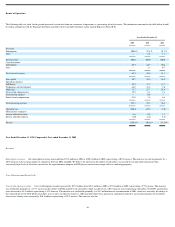NetFlix 2002 Annual Report Download - page 21
Download and view the complete annual report
Please find page 21 of the 2002 NetFlix annual report below. You can navigate through the pages in the report by either clicking on the pages listed below, or by using the keyword search tool below to find specific information within the annual report.
statements and accompanying notes. The SEC has defined a company’s critical accounting policies as the ones that are most important to the portrayal of the company’s financial condition
and results of operations, and which require the company to make its most difficult and subjective judgments. Based on this definition, we have identified the critical accounting policies and
judgments addressed below. Although we believe that our estimates, assumptions and judgments are reasonable, they are based upon information presently available. Actual results may
differ significantly from these estimates under different assumptions, judgments or conditions.
Change in Estimated Life of the Cost of Our Library
In late 2000 and early 2001, we entered into a series of revenue sharing agreements with studios, which substantially changed our business model for acquiring DVDs and satisfying
subscriber demand for titles. These revenue sharing agreements enable us to acquire DVDs at a lower upfront cost than traditional buying arrangements. We share a percentage of the net
revenues generated by the use of each particular title with these studios over a fixed period of time, generally 12 months. Before the change in our business model, we typically acquired
fewer copies of a particular title and utilized each copy over a longer period of time. The implementation of these revenue sharing agreements improved our ability to acquire larger quantities
of newly released titles and satisfy a substantial portion of subscriber demand for such titles over a shorter period of time. On January 1, 2001, we revised the amortization policy for the cost
of our library from an accelerated method using a three−year life to the same accelerated method of amortization using a one−year life.
The change in life has been accounted for as a change in accounting estimate and is accounted for on a prospective basis from January 1, 2001. Had we continued to amortize the DVDs
acquired prior to January 1, 2001 using a three−year life, amortization expense for 2001 would have been $4.7 million lower than the amount recorded in our financial statements.
Amortization of Upfront Costs of Our Library
Under our revenue sharing agreements, we remit an upfront payment to acquire titles from the studios. This payment includes a contractually specified initial fixed license fee that is
capitalized. Certain of these payments also include a contractually specified prepayment of future revenue sharing obligations that is classified as prepaid revenue sharing expense and is
expensed as revenue sharing obligations are incurred. The initial fixed license fee is amortized on an accelerated basis over one year. We believe the use of an accelerated method is
appropriate because we normally experience heavy initial demand for a title, which subsides once initial demand has been satisfied.
Revenues
We derive substantially all of our revenues from monthly subscription fees. From the launch of our Web site in April 1998 through January 1999, we generated revenues primarily from
individual DVD rentals and sales to customers. In March 1999, we stopped selling new DVDs. From February 1999 through October 1999, we generated revenues primarily from individual
DVD rentals to customers. In September 1999, we launched our subscription service, and through February 2000, for a fixed monthly subscription fee of $15.95, subscribers could have up to
four titles per month with no due dates or late fees, and for $3.98, could order an additional title. In February 2000, we modified our standard subscription service to provide subscribers
access to an unlimited number of titles for $19.95 per month, with a maximum of four titles out at any time. Existing subscribers were switched to our new service, some at $15.95 per month
and the rest at $19.95 per month. In October 2000, we again modified our standard subscription service to provide subscribers access to an unlimited number of titles for a fixed monthly fee,
with a maximum of three titles out at the same time. There is no minimum subscription period and subscribers can cancel our service at any time.
We had no DVD sales in 2000 and insignificant amounts in 2001 and 2002. Beginning in late 2000, as part of the change in our business model, we began acquiring larger quantities of
particular titles through our revenue
12
























